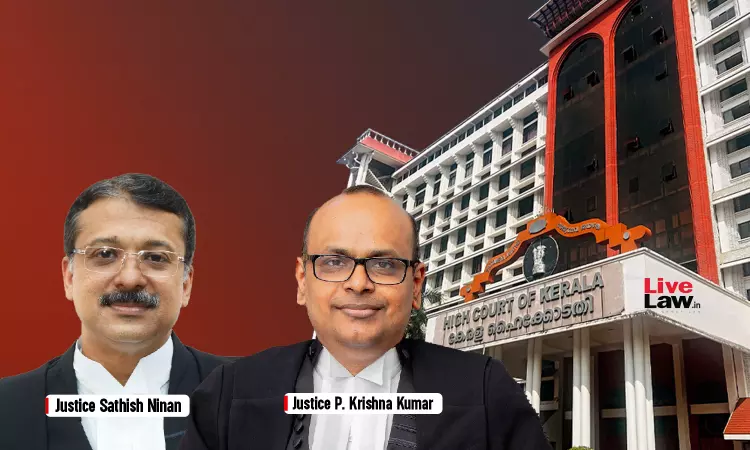- Home
- /
- High Courts
- /
- Kerala High Court
- /
- Separate Property Acquired By...
Separate Property Acquired By Mitakshara Hindu Who Died Before 1956 Completely Devolves Upon Son: Kerala High Court
Anamika MJ
6 Oct 2025 7:17 PM IST
The Kerala High Court has held that the separate property acquired by a Hindu governed by Mitakshara law, who died before 1956, will completely devolve upon his son.The Division Bench comprising Justice Sathish Ninan and Justice P. Krishna Kumar observed that the Hindu Law of Inheritance (Amendment ) Act, 1929 did not affect the son's absolute right to inherit his father's property. “It...
The Kerala High Court has held that the separate property acquired by a Hindu governed by Mitakshara law, who died before 1956, will completely devolve upon his son.
The Division Bench comprising Justice Sathish Ninan and Justice P. Krishna Kumar observed that the Hindu Law of Inheritance (Amendment ) Act, 1929 did not affect the son's absolute right to inherit his father's property.
“It merely enlarged the circle of heirs who could succeed in default of male issue, by introducing certain female heirs and the sister's son.” the bench observed.
The judgment was delivered in a regular first appeal, affirming the dismissal of a partition suit by the Additional Subordinate Judge's Court, Irinjalakuda. The appellants are the legal heirs of a deceased daughter, Yasodamma, claiming co-ownership along with the heirs of her brother, Hari Pai in 2.15 acres of land which was the self acquired property of Rama Pai, the father. The property was solf to a firm and its partner by the son Hari Pai through a registered sale deed.
The appellants contended that by virtue of the Hindu Law of Inheritance (Amendment) Act, 1929, both male and female children were equally entitled to inherit a father's separate property. Conversely, the respondents argued that before 1956, such property devolved exclusively upon the male heir, with daughters succeeding only in the absence of sons.
The Court reviewed the Hindu law texts, precedents, and statutory provisions, and held that the 1929 Amendment Act merely introduced a limited category of female heirs—such as the son's daughter, daughter's daughter, sister, and sister's son, but did not alter the fundamental Mitakshara principle that a male's separate property descended solely to his male issue.
Relying on Arunachala Gounder (Dead) by Lrs. v. Ponnusamy & Ors. (AIR 2022 SC 605), the Court reiterated that the 1929 Act did not modify the fundamental concepts of Shastric Hindu law relating to inheritance.
“The only difference it introduced was that the chance of inheritance of a son's daughter, daughter's daughter, sister, etc., was recognised in a different capacity from that which prevailed earlier.” the court observed.
The Court also relied on the Privy Council's decision in Katama Natchiar v. Srimut Rajah Moottoo Vijaya Raganadha Bodha Gooroo Sawmy Periya Odaya Taver [MANU/PR/0010/1863], which held that the separate estate of a Hindu male descends to his male issue, and only in default of such issue would it descend to his to his widow or daughter.
The court thus held that since the original owner had died prior to 1956, the self-acquired property devolved entirely upon his son, under the unamended Mitakshara law. Consequently, the sale executed by Hari Pai and his family in 1965 was held valid, and the property was found not partible among the descendants of his sister, Yasodamma.
Accordingly, the Regular First Appeal was dismissed, with no order as to costs.
Case Title: Sivananda Prabhu and Ors. v S N Govinda Prabhu & Brothers and Ors.
Case No: RFA 62/ 2011
Citation: 2025 LiveLaw (Ker) 625
Counsel for Appellants: G Sreekumar, Preethy, K Ravi
Counsel for Respondents: K S Rajesh, V V Asokan, K B Arunkumar, K I Mayankutty Mather (Sr.), C E Manoj Nair, Rukhyabi Mohd Kunhi, M Shaju Purushothaman
Click Here To Read/ Download Judgment



